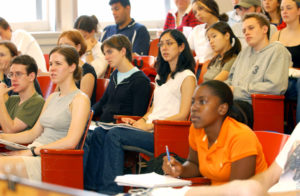Why are Movies so Dark? America’s video and film narratives are out of whack with the optimism that an individual needs in order to thrive.
There are obviously many cultural forces at work in shaping the movies and television series that capture our attention. But taking a long view, the national nervous system seems overwhelmed with accounts for climate catastrophes, political mean-spiritedness and personal despair brought on by a social structure that still leaves too many behind. Shooter games are a better signifier of what films have become rather than novels about relationships. And then there is an apparent and natural impulse in men and boys to master games of destruction. Kids with every advantage are probably as enamored with games of domination and death as those who might justifiably use them as a kind of catharsis. Add in media that shows the worst of human behavior accessible on any time of the day, and we can be loaded down with dispair.
My impression is that too much of America’s video and film narratives are out of whack with the optimism that the individual needs in order to thrive. The case for this conclusion is incredibly easy to make. According to the data base, IMDb, the top grossing movies in the U.S. last year are notable for their dark subjects that range from cartoonish to vividly real. There is “Gorr the God Butcher” in Thor, versions of Dr. Strange who “threatens to wipe out millions,” Batman against a “sadistic serial killer,” and even a minion who wants to become “the world’s greatest supervillain.” Most films with characters like these target young viewers. Their older counterparts are predictably in for even darker fair. Reading the brief summaries of top-grossing films in the U.S. is an exercise in trying to fathom a world gone mad. Genre movies dominate. Even those produced under the Disney umbrella can be surprisingly grim. Do these films lift the spirits of those who are watching? For example should we have to look to a young actor’s script from 30 years ago to find a scene with real humans displaying pure and unalloyed joy?
A 60s band from Erie Pa. hears the first radio airplay of their only hit. (Writer: Tom Hanks, That Thing You Do!)
Narratives naturally thrive on some sort of conflict or human impasse. To be sure, no one expects the broad viewing public to demand more costume dramas inside old English manor houses. And the kinds of rom coms that played to the mainstream in the 1960s are unlikely to return. Think of studio products that featured Doris Day, Rock Hudson, Fred Astaire, or Cary Grant. A few films still use their old Hollywood tropes. But most U.S. producers have ceded the idea of pressing for post-modern stories that could usefully explore the backstories of families or institutions, faltering or thriving. There is not enough Richard Linklaters or Wes Andersons able to find backers and willing to risk explorations into the inner lives and dense pluralities within ordinary souls. I suspect that the truth is that the hardest task for a film team is the creation of truly layered characters that can surprise us with their insights.
What seems to be missing in the mix of releases are films represented by master screenwriters like Neil Simon, David Mamet, Ruth Prawer Jhabvala, Aaron Sorkin, James Brooks, Larry Gelbart, William Goldman, Wes Anderson, Nora Ephron and many others. Their films are usually about the interpersonal dynamics that define their characters: words and non-verbal cues that others in a narrative must answer. Some work on the very human challenges of connecting or disconnecting with the significant others through comedy; others took a hard look at the harsh conversations that individuals must negotiate in lieu of filmic but inhuman action that typically drives a fantasy plot forward.
It is interesting to look at older films that are most frequently revisited. They include obvious choices like Citizen Kane (1941), All About Eve (1950), Casablanca (1942), Some Like it Hot (1959) and Singing in the Rain (1952). Some are dreams of a fertile imagination. But most take us to places without guns or magical powers. Some would be considered “talky” by modern standards. But all also had the virtue of relying on language written into scenes of intense feelings and heightened expression. This is in the realm of our human birthright to engage in discourse. It is what defines us as humans.
There is a curious twist here. The United States is not a routinely unruly society. Most of its cities and towns are relatively peaceful. But many Americans seem to identify with con artists, crooks, and tax cheats. There are our standard cinematic romances with violence: from Bonnie and Clyde to Mad Max to Indiana Jones. And there is the even more obvious example of a presidential candidate whose obvious criminality is even acknowledged by his supporters. In our day, political chaos seems to be its own reward.
Would it be outrageous to suggest that Martin Scorsese’s most satisfying film is not Taxi Driver (1976), but Hugo (2011)? More than we do, we should want the latter film’s message of hope.
![]()






